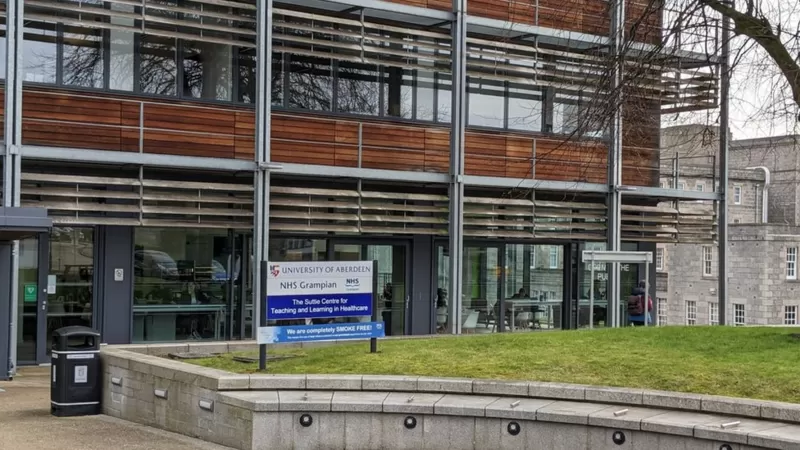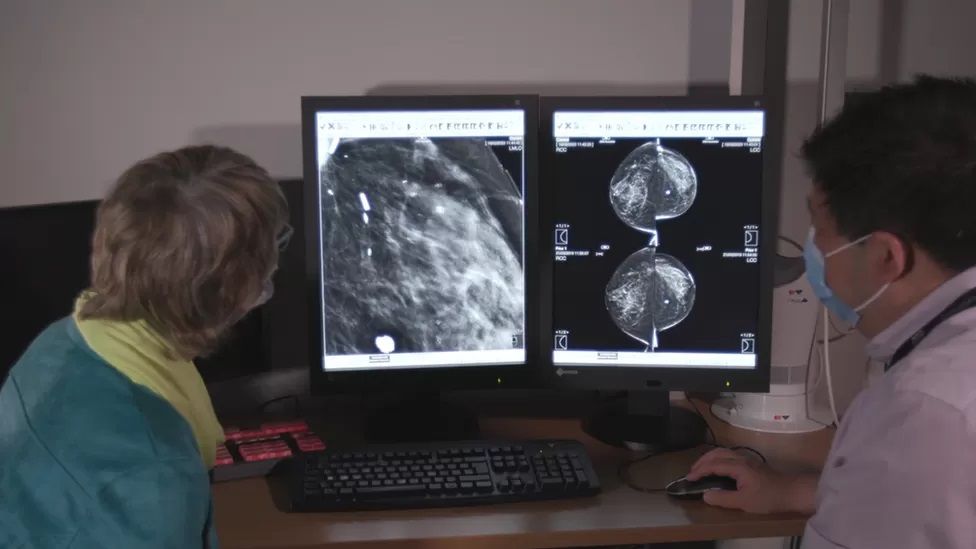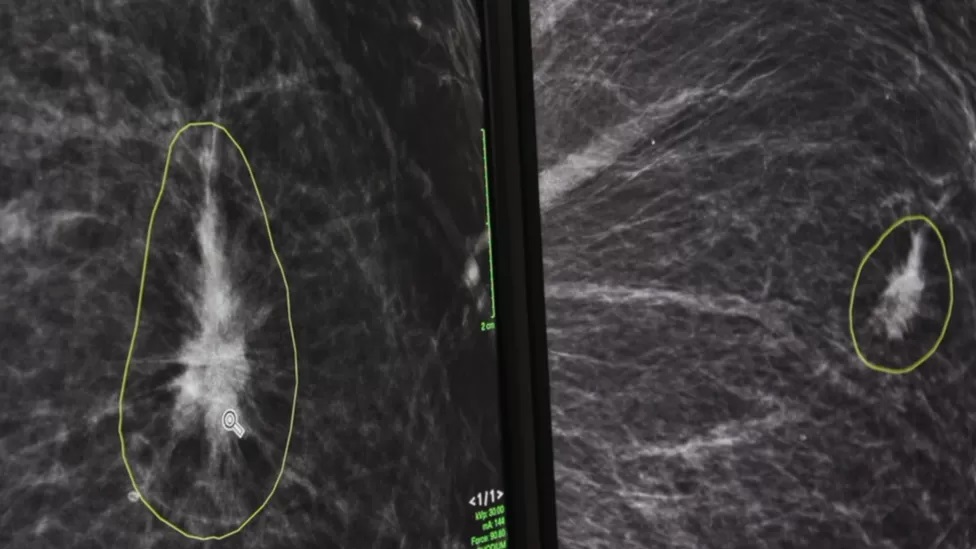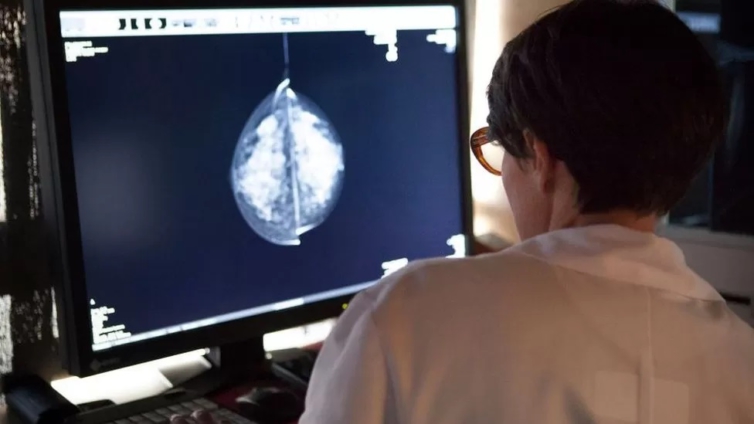A trial underway at Aberdeen Royal Infirmary is exploring whether artificial intelligence (AI) can assist radiologists in reviewing thousands of mammograms a year.
The pilot helped spot early-stage breast cancer for June - a healthcare assistant and participant in the trial - and she is now set to undergo surgery as a result.
Mammograms are low level X-rays used in breast cancer screenings to monitor and detect changes too small to see or feel.
According to the NHS, they help save about 1,300 lives each year in the UK.
And while the number of women who attended a routine breast screening, after an invitation, increased in Scotland in the three-year period to 2022, the number of radiologists to review results is shrinking.
What is AI?
AI - technology which sees computers perform specific tasks that would typically require human intelligence - is already widely used across a range of industries.
While high-profile experts' fears that AI could lead to the extinction of humanity have recently been making headlines, the tech's more practical realities are already being shown in healthcare.
Its potential to speed up the process of drug and disease discovery means many scientists and doctors see AI as a powerful tool to work with, rather than replace, practitioners.
Aberdeen's AI trial

The number of screen-detected breast cancers of women of all ages grew to 1,830 between 2021 and 2022 in Scotland, according to Public Health Scotland (PHS) data.
Of the 5,000 mammograms scrutinised on average by radiologists each year, between 250 and 300 patients will be called back - with 30 to 40 of them requiring closer attention.
"There is a chance that with that number, you could miss cancers," Dr Gerald Lip, clinical director of the North East Scotland Breast Screening Programme, told BBC Click.
NHS Grampian's Gemini project - a collaboration between the NHS, the University of Aberdeen and private industry - was mentioned in Scotland's AI Strategy when it launched in 2021.
Kheiron Medical Technologies developed the AI model Mia, used in the trial, with Microsoft providing the cloud computing services to support it.
With rules set by the National Screening Counsel currently forbidding the automatic deployment of AI in screenings, Dr Lip and other radiologists are trialling it as an additional check at the end of mammogram scan reviews.
June, a participant in the trial who has undergone similar surgery before, received a biopsy to remove a small part of her breast tissue for testing after Dr Lip explained how the AI tool helped identify an area of concern.

He showed BBC Click how the software works using anonymised mammogram results.
"What we're seeing now is a lady who's got mammograms on the left side and right side, you're looking for differences," he said.
By clicking a button, radiologists can view and check differences identified by the AI between the two scans.
Dr Lip pointed to one area circled by the AI software, identifying it as the main area of concern.

"In screening you want to pick up things when they are small before they become big," he added.
A few weeks after her biopsy, June told Click that using AI - rather than another human pair of eyes - made the process feel less intrusive.
"You know your images are on screen, and people are looking at them," she said. "Whereas when it's an artificial intelligence, that bit of feeling that somebody is looking has gone."
The results of June's biopsy means she will once again be having surgery.
"The biopsy showed that I do have an early-stage cancer, they've certainly caught it at an earlier stage this time," June said. "But because I've had previous history with it, I'm going to go in and have a mastectomy.
"It's not treatment I want to have. But at the same time, it's reassuring that it's being caught."
'Chronic staff shortages'
A major review of Scotland's breast screening programme published last year suggested a large number of radiology and advance practitioner staff are either nearing or at retirement age.
It said the decline of "super reader" radiologists, relied on by the service to review a particularly high number of results, risks leaving the service "vulnerable".
The Royal College of Radiologists has also warned the UK is facing "chronic staff shortages", with patients waiting too long for vital tests and cancer treatments.

"In screening you want to pick up things when they are small before they become big," he added.
A few weeks after her biopsy, June told Click that using AI - rather than another human pair of eyes - made the process feel less intrusive.
"You know your images are on screen, and people are looking at them," she said. "Whereas when it's an artificial intelligence, that bit of feeling that somebody is looking has gone."
The results of June's biopsy means she will once again be having surgery.
"The biopsy showed that I do have an early-stage cancer, they've certainly caught it at an earlier stage this time," June said. "But because I've had previous history with it, I'm going to go in and have a mastectomy.
"It's not treatment I want to have. But at the same time, it's reassuring that it's being caught."
'Chronic staff shortages'
A major review of Scotland's breast screening programme published last year suggested a large number of radiology and advance practitioner staff are either nearing or at retirement age.
It said the decline of "super reader" radiologists, relied on by the service to review a particularly high number of results, risks leaving the service "vulnerable".
The Royal College of Radiologists has also warned the UK is facing "chronic staff shortages", with patients waiting too long for vital tests and cancer treatments.
With two radiologists needed to read and report results, the Scottish government's review said replacing one human reader with AI could "cover half of the screening image reading burden of approximately 1.72 million images read each year".
But could the technology being tested in Aberdeen some day replace human staff?
"I think the goal of this evaluation is to see what's the best way we can work with AI, whether it's replacing one of the radiologists, whether it's part reading some of the normal mammograms, or whether it's to improve our cancer detection as a safety net," Dr Lip said.
Peter Kecskemethy, co-founder of Kheiron, said the tech will used by more than 30 NHS trusts across the UK for millions to access.
And with trusts in England already exploring how AI can support better, faster outcomes for breast cancer patients, the tech looks to continue playing a large role in helping doctors save lives.
Latest Stories
-
Togbe Afede XIV calls for drastic restructuring of Bank of Ghana
22 mins -
Eric Johnson
31 mins -
Djokovic struck by water bottle at Italian Open
34 mins -
777 call in finance experts as Everton uncertainty grows
38 mins -
Casemiro left out of Brazil squad for Copa America
41 mins -
Chelsea sacking would not be a problem – Pochettino
43 mins -
Man Utd owners have ‘common sense’ – Ten Hag
46 mins -
Nduom hints at #BringBackGNBank nationwide campaign
5 hours -
GWCL staff locked up, assaulted for disconnecting defaulter
6 hours -
Akufo-Addo, Asantehene commission Prempeh I International Airport, Kumasi
6 hours -
We are confident about board meeting in June on Ghana’s second review – IMF
6 hours -
Eugene Osei Tutu: Who can lay claim to Kumasi International Airport- Mahama or Akufo-Addo?
6 hours -
Mbappe confirms he will leave Paris St-Germain
6 hours -
CAA Region II Athletics Championships will be properly organised – Dr Baah-Nuakoh
6 hours -
Over 185 state bungalows for public servants near completion in Ashanti Region
6 hours

